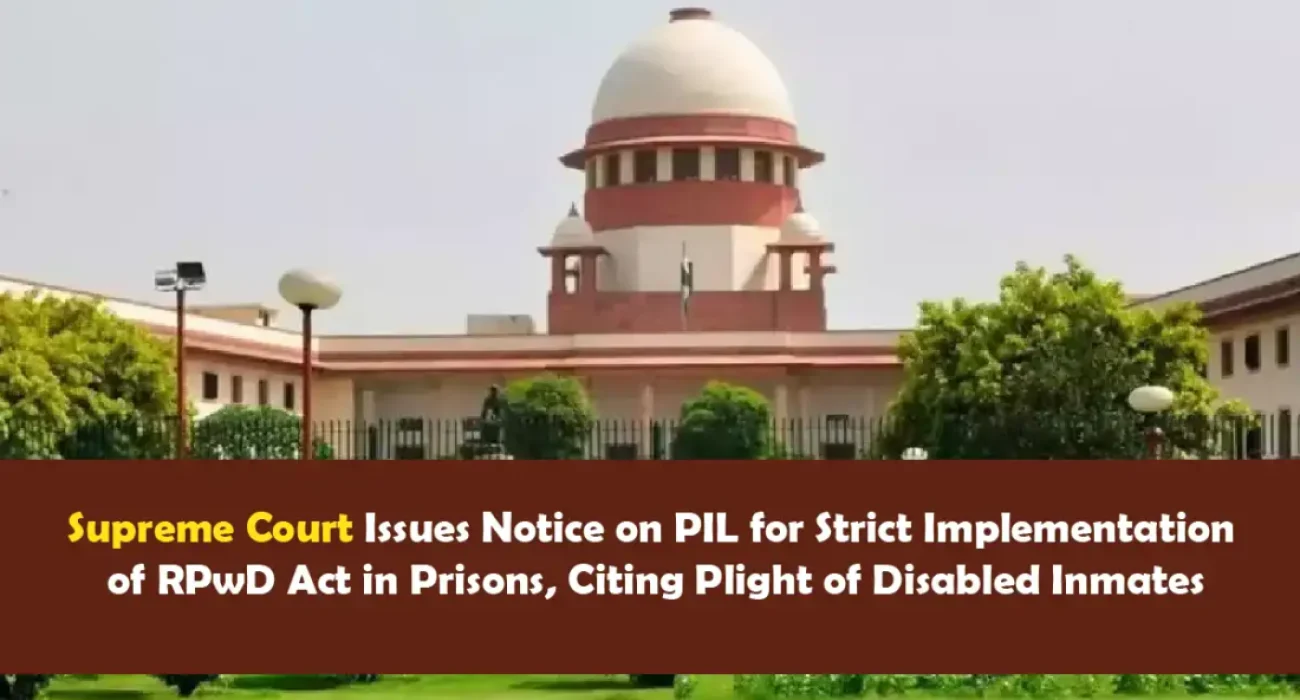

Table of Contents
ToggleThe Supreme Court recently issued notice on a Public Interest Litigation (PIL) that calls for the strict implementation of the Rights of Persons with Disabilities Act, 2016 (RPwD Act) in Indian prisons. The PIL, filed by a political activist in Kerala, highlights the difficulties faced by prisoners with disabilities, such as Professor GN Saibaba and Stan Swamy, who have suffered due to inadequate facilities and care in prisons. The petitioner points out that prisoners with disabilities (PwD) are currently housed under the same conditions as non-disabled inmates, violating their constitutional and legal rights, particularly those under the RPwD Act.
The petitioner argues that there are no specific provisions in prison manuals to accommodate the needs of PwD prisoners, leaving them vulnerable and subjected to discriminatory conditions. He emphasizes that prisoners with physical disabilities, such as paraplegics, face significant challenges, such as inadequate housing, lack of accessible toilets, and absence of necessary medical care like physiotherapy. The petitioner also stresses that overcrowded and poorly managed prisons exacerbate these issues, leading to neglect, violence, and inadequate medical attention for disabled inmates.
The petitioner cites the unfortunate cases of Professor GN Saibaba and Stan Swamy, who suffered health deteriorations directly linked to inhumane prison conditions. Saibaba’s deteriorating condition was worsened by prolonged incarceration, while Swamy’s death was a result of complications due to Parkinson’s disease, which was inadequately treated in prison.
The respondent authorities, including the Union of India and state prison departments, have yet to respond in full. The focus of the issue lies in the lack of a structured legal framework to enforce disability accommodations in prisons. The petitioner points out that while some states, such as Delhi, Goa, and Haryana, have provisions in their prison manuals, these remain insufficient and fail to meet the specific needs of PwD prisoners.
The Supreme Court bench, comprising Justices Vikram Nath and Sandeep Mehta, has issued notice on the PIL, scheduling further hearings for 8 April 2025. The Court expressed concern over the lack of implementation of disability rights in Indian prisons and noted that the absence of tailored accommodations for PwD inmates could lead to severe dehumanization. “Prison conditions in themselves are inhumane for non-PwD prisoners, but the brunt of neglect falls more heavily on the PwD prisoners,” the petition highlights, and the Court has taken serious note of this claim.
The Court also recognized that the situation is aggravated by overcrowding in prisons, which, combined with a lack of infrastructure for disabled individuals, contributes to the violation of fundamental rights under the Constitution.
The Supreme Court issued a notice to the respondent authorities, directing them to respond to the PIL seeking the implementation of the RPwD Act in prisons. The matter is slated for further consideration on 8 April 2025. The Court has expressed intent to explore the issues of accessibility, medical care, and other specific needs of PwD prisoners. The Court emphasized that ensuring the rights of disabled prisoners requires a comprehensive approach that goes beyond judicial intervention and must include systemic and legal reforms.
Credits: Deeksha Rai
IAW resources
Browse our help directory